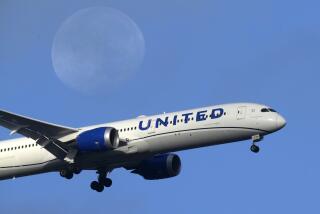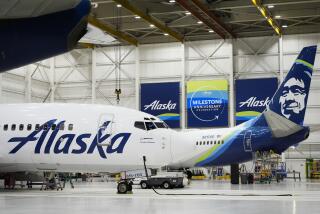Executive Travel : Technology, Security Precautions Help Curtail Frequent-Flier Fraud
- Share via
Amassing frequent-flier miles is certainly a popular activity, but a few people are so bent on getting free tickets, upgrades and other benefits that they turn to crime to rack them up.
Enough cases make it to court, in fact, that Randy Petersen, editor of InsideFlyer magazine in Colorado, now has a side career as an expert witness in frequent-flier fraud cases. Petersen has already testified in about 40 cases, and he said the rate of requests is increasing.
Tighter airline regulations, electronic ticketing and new security mandates issued by the Federal Aviation Administration have limited the possibilities for fraud, but “there are still a lot of sneaky people out there,” Petersen said.
Airlines are finding new ways to monitor and track frequent-flier abusers, but naturally they don’t like to talk about it much. “I don’t think I’m going to tell you how people can defraud the airline and get away with it,” said one airline representative.
Petersen estimates that fraud involving miles and airline tickets costs the airlines about $100 million a year.
Some of the cheating is fairly simple, such as an infrequent flier being paid or talked into flying in someone else’s name so that person gets the miles. But if the traveler is identified by the airline, the frequent flier risks losing all of his or her miles. The same risks apply to travelers who sell their awards.
More elaborate schemes have led to prosecution. Scavengers have looked through airport trash for used tickets, erased the names, substituted their own and submitted copies of the tickets to the airlines as evidence of trips that supposedly failed to show up on their mileage statements.
Another scheme, Petersen said, involves buying a full-fare ticket, checking in to receive the miles, then not boarding the plane and submitting the unused ticket for a refund.
In court cases, these travelers often tell judges that they felt justified in breaking the rules because they hadn’t been able to use their miles the way they wanted to. They feel the airline has cheated them, Petersen said, so they feel free to cheat back.
Justified or not, the rules are the rules, he said. “I tell people the airlines always prevail in these cases.”
“Miles are not considered property,” United Airlines spokeswoman Mary Jo Holland said. That means they can’t be passed to anyone else, even as part of an estate or in a divorce action.
This varies by airline, however. Southwest, which uses trip segments instead of miles as the unit for earning free tickets, does allow passengers to give them to family members. Other airlines allow miles to be transferred to a spouse or child if the traveler dies. But all airlines forbid the selling of frequent-flier miles.
Of course, many cases of frequent-flier fraud never go to court because the perpetrator pays the penalty right there.
“It’s either buy a full-fare ticket on the spot or catch the next Greyhound out of there,” Petersen said.
And when someone is caught using a fraudulent ticket, the airline can review the entire frequent-flier portfolio of that passenger, Delta spokesman Clay McConnell said. “Every accumulated mile is subject to being penalized.”
There are many reasons people cheat with their miles, Petersen said. Some of them stem from greed, and some are the result of travel boredom.
“It’s almost like gambling,” Petersen said. “Most of the people I know who got busted are good citizens otherwise.”
Cheaters may well find it harder to get their kicks this way in the future. The airlines expect the incidence of fraud will decline as electronic ticketing replaces the paper system, and as systems for matching boarding records with ticket records continue to improve.
“It’s happening a lot less often than it used to,” McConnell said. “It’s a lot more difficult to get away with it.”
New security precautions mandated by the FAA requiring all passengers to show photo identification are also helping to cut fraud.
“Using new technology and new security precautions will certainly curtail fraud, but not all the fraud,” Petersen said. “As long as airline travel remains popular, there will be people trying to circumvent the system.”
Carol Smith is a freelance writer based in Pasadena. Readers with questions or comments about Executive Travel can write to Executive Travel Editor, Business Section, Los Angeles Times, Times Mirror Square, Los Angeles, CA 90053, or send an electronic message to business@news.latimes.com on the Internet.
More to Read
Sign up for The Wild
We’ll help you find the best places to hike, bike and run, as well as the perfect silent spots for meditation and yoga.
You may occasionally receive promotional content from the Los Angeles Times.






